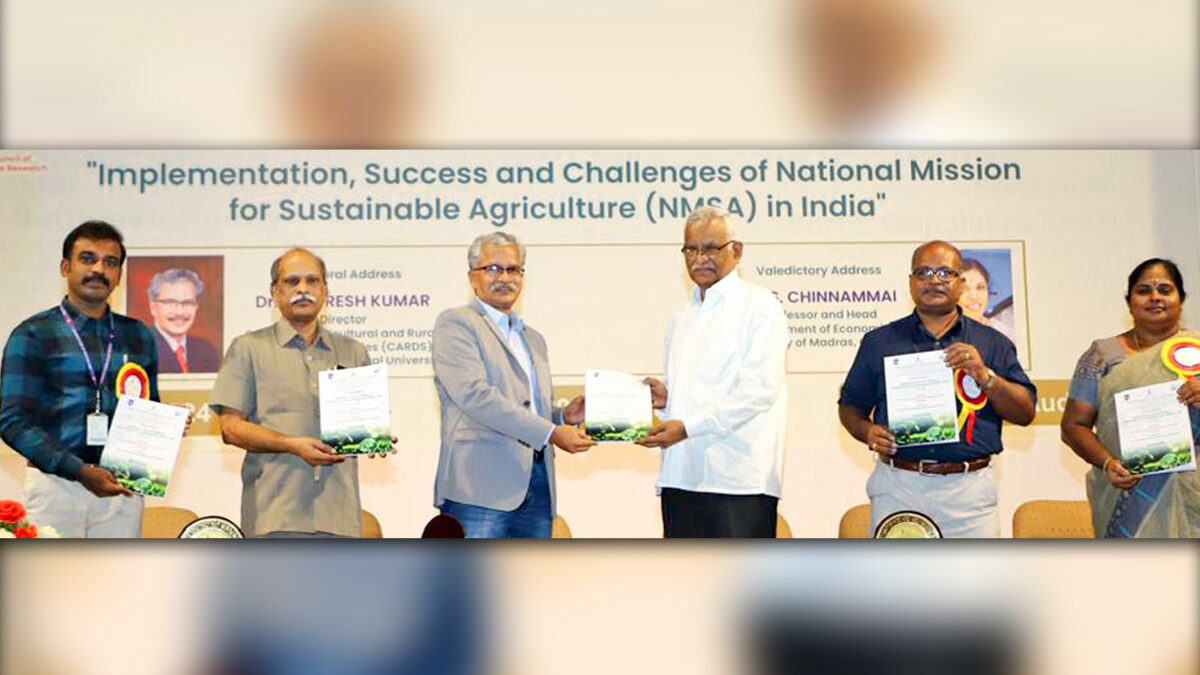Indian Council of Social Science Research (ICSSR) Sponsored a one-day national seminar on Implementation, Success and Challenges of Sustainable Agriculture (NMSA) in India was conducted successfully recently at PSG College of Arts & Science College.
The seminar brings together thought leaders, policymakers, researchers, and students to discuss the pressing issues surrounding sustainable agricultural practices in the country.
The seminar was presided by Senguttuvan, Principal incharge of the college. Kannaian, Secretary, felicitated the seminar. Ravikumar, Head of the Department organized the seminar.
Sampath, Organising Secretary, Department of Economics of the Institution, was focused on evaluating the progress of the National Mission on Sustainable Agriculture (NMSA), which was launched to address key challenges in the agriculture sector, including soil health management, water conservation, and climate-resilient farming techniques.
The event also aimed at identifying the successes and ongoing challenges in implementing sustainable agriculture practices across India.
The Chief Guest for the inauguration session was Suresh Kumar, Director, Center for Research and Development Studies, Tamil Nadu Agricultural University, Promoting Center of NMSA, Coimbatore.
The Valedictory Session, Chief Guest was Chinnammai, Professor and Head, Department of Economics, University of Madras, Chennai.
Totally 256 research papers were received from different parts of the country and divided into three technical sessions for the discussions. The resource persons of the technical sessions are Jayaraman, Professor and Head, Department of Economics; Periyar University, Salem; Ulaganathan, Assistant Professor, Guru Nanak College; Shanmugam, Associate Professor, Bharathiar University; Senthamiz Selvi, Hindustan College of Arts & Science, Chennai; Kannan, CBM College, Abdul Jamal, The New College, Chennai; Jagan Gopu, Guru Nanak College, Chennai; Priyadharshini, Thiagarajar College, Madurai and Ranjith Kumar, Bishop Heber College, Trichy.
Key Highlights and Discussions:
Implementation and Policy Framework:
The seminar opened with an insightful keynote address by Suresh Kumar, who outlined the objectives and policies under the NMSA. Emphasizing the need for systemic changes in agricultural practices, the speaker highlighted the government’s commitment to promoting organic farming, improving water-use efficiency, and enhancing soil health across the country. He also insisted this outcome of the seminar to forward to the policymakers to make effective implementation.
Success Stories Across India
Several case studies were presented during the technical sessions, showcasing how farmers in states like Punjab, Maharashtra, Kerala, Rajasthan and Tamil Nadu have adopted sustainable practices with the support of NMSA. These stories demonstrated significant improvements in crop yields, enhanced water management, and better livelihoods for farmers who integrated organic farming and conservation techniques into their practices.
Challenges to Widespread Adoption
Despite the progress, experts discussed several barriers to the large-scale implementation of sustainable agriculture. Among the challenges highlighted were limited access to resources and technology, lack of awareness among farmers, inadequate infrastructure, and the adverse effects of climate change. Addressing these challenges, experts called for greater investment in farmer education, better infrastructure, and a multi-stakeholder approach involving government bodies, private organizations, and NGOs.
Role of Technology
The role of modern technologies, such as precision farming, remote sensing, and digital platforms, was a major focus during the seminar. Experts emphasized how these technologies can enhance resource use efficiency, reduce input costs, and help farmers adapt to changing climatic conditions.
Future Outlook
The seminar concluded with a call for enhanced collaboration among farmers, the government, and the private sector. Experts advocated for scaling up successful initiatives, creating more awareness among farmers about sustainable practices, and ensuring that the benefits of sustainable agriculture reach all regions of India.
The seminar provided a valuable platform for stakeholders to come together and exchange ideas on advancing sustainable agriculture practices in India. As the country faces growing challenges in ensuring food security and environmental sustainability, the discussions highlighted the crucial need for continued investment in education, infrastructure, and technology to support the widespread adoption of sustainable farming practices.




